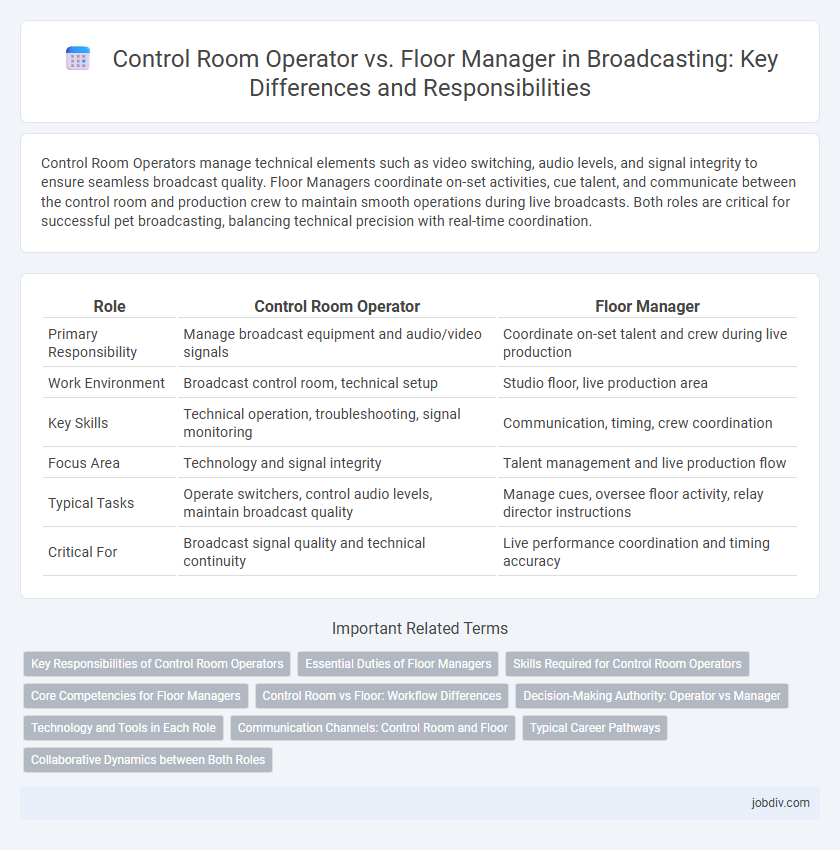Control Room Operators manage technical elements such as video switching, audio levels, and signal integrity to ensure seamless broadcast quality. Floor Managers coordinate on-set activities, cue talent, and communicate between the control room and production crew to maintain smooth operations during live broadcasts. Both roles are critical for successful pet broadcasting, balancing technical precision with real-time coordination.
Table of Comparison
| Role | Control Room Operator | Floor Manager |
|---|---|---|
| Primary Responsibility | Manage broadcast equipment and audio/video signals | Coordinate on-set talent and crew during live production |
| Work Environment | Broadcast control room, technical setup | Studio floor, live production area |
| Key Skills | Technical operation, troubleshooting, signal monitoring | Communication, timing, crew coordination |
| Focus Area | Technology and signal integrity | Talent management and live production flow |
| Typical Tasks | Operate switchers, control audio levels, maintain broadcast quality | Manage cues, oversee floor activity, relay director instructions |
| Critical For | Broadcast signal quality and technical continuity | Live performance coordination and timing accuracy |
Key Responsibilities of Control Room Operators
Control Room Operators in broadcasting primarily monitor live feeds, manage technical equipment, and ensure seamless transmission quality. They handle audio-video signal routing, troubleshoot technical issues, and coordinate with engineering teams to maintain broadcast continuity. Their role is distinct from Floor Managers, who oversee on-set activities and talent coordination during live productions.
Essential Duties of Floor Managers
Floor Managers coordinate live production elements by managing on-set talent and crew, ensuring smooth communication between directors and performers. They oversee timing, cue talent, and maintain safety protocols during broadcasts. Their essential duties include managing set logistics, facilitating prompt scene changes, and resolving unforeseen issues in real time.
Skills Required for Control Room Operators
Control Room Operators require advanced technical skills in audio and video signal management, proficiency with broadcasting automation systems, and real-time troubleshooting abilities to ensure seamless transmission. They must possess strong attention to detail and quick decision-making skills to efficiently manage live broadcasts and respond to any technical issues. Familiarity with communication protocols and coordination with other technical teams is essential to maintain broadcast quality and continuity.
Core Competencies for Floor Managers
Floor Managers excel in real-time coordination and communication, ensuring smooth execution of live broadcasts by managing talent, crew, and timing on the studio floor. Their core competencies include strong situational awareness, quick decision-making, and the ability to relay precise cues to both on-air talent and technical staff. Unlike Control Room Operators who focus on technical equipment and signal flow, Floor Managers prioritize on-set dynamics and immediate problem-solving to maintain seamless production flow.
Control Room vs Floor: Workflow Differences
Control Room Operators manage technical equipment and oversee broadcast signals from a centralized location, ensuring smooth transmission and resolving technical issues in real-time. Floor Managers coordinate on-set activities, including talent and camera movements, to maintain production flow and execute the director's vision during live broadcasts. The control room emphasizes technical precision and signal integrity, while the floor focuses on real-time coordination and physical production management.
Decision-Making Authority: Operator vs Manager
Control Room Operators oversee technical systems, making real-time decisions on signal quality, equipment functionality, and broadcast continuity to ensure seamless transmission. Floor Managers have authority over on-set activities, directing talent and crew to follow production cues and maintaining order during live broadcasts. The operator's decisions prioritize technical execution, while the floor manager focuses on creative coordination and immediate issue resolution on the studio floor.
Technology and Tools in Each Role
Control Room Operators utilize advanced broadcast automation systems, signal routers, and monitoring software to manage live feeds and ensure seamless transmission quality. Floor Managers rely on two-way communication devices, cue cards, and tally light systems to coordinate on-set activities and direct talent and crew efficiently. Both roles integrate specialized technology tailored to their operational environments, optimizing workflow within broadcast production.
Communication Channels: Control Room and Floor
Control Room Operators communicate through centralized communication systems linking the broadcast control room with various technical departments to ensure seamless signal flow and real-time problem resolution. Floor Managers utilize wireless communication devices such as IFB earpieces and handheld radios to directly coordinate cues and instructions with on-set talent and crew members during live productions. Efficient coordination between Control Room Operators and Floor Managers via these distinct communication channels is critical for maintaining broadcast timing and production quality.
Typical Career Pathways
Control Room Operators often begin their careers in entry-level technical roles such as broadcast technicians or video editors, progressing to positions that require expertise in signal switching, audio mixing, and live transmission management. Floor Managers typically start as production assistants or stagehands, advancing through roles that develop skills in cueing talent, coordinating live studio activities, and managing on-set communications. Both career pathways emphasize increasing responsibility in live broadcast coordination, technical proficiency, and leadership within fast-paced production environments.
Collaborative Dynamics between Both Roles
Control Room Operators manage technical equipment and ensure signal quality, while Floor Managers coordinate on-set activities and communicate directives to talent and crew. Their collaborative dynamics hinge on real-time communication to synchronize production workflows and swiftly resolve issues. Efficient collaboration between both roles enhances broadcast precision and seamless program delivery.
Control Room Operator vs Floor Manager Infographic

 jobdiv.com
jobdiv.com